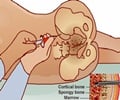A new study has found that not only is calcium required for strong and healthy bones, it could also play a vital role in determining bone health for life.

They found that the bone densities in the pigs that were fed the calcium-deficient diet were lower as compared to that of the other half. Moreover, certain stem cells in bone marrow, in the calcium-deficient piglets appeared to have already been programmed to become fat cells instead of bone-forming cells.
However, blood tests didn't indicate any difference in levels of the hormonal form of vitamin D, which regulates the amount of calcium circulating in the blood of older children and adults. Dr. Chad Stahl, an associate professor of animal science who led the study, said this suggests that calcium regulation in newborns isn't dependent on vitamin D.
Because these programmed mesenchymal stem cells replicate to provide all the bone-forming cells for an animal's entire life, very early calcium deficiency may have predisposed the piglets to have bones that contain more fat and less mineral. That could make those pigs more prone to osteoporosis and obesity in later life, said Stahl.
The researchers plan to extend this study to see if the calcium deficiency in early life in the piglets also has an impact on sexual maturity.
The researchers are using pigs as a model for human health because pigs and humans are similar when it comes to bone growth and nutrition. Pigs are one of the few animals known to experience bone breaks related to osteoporosis, Stahl said.
Advertisement
Source-ANI
THK













